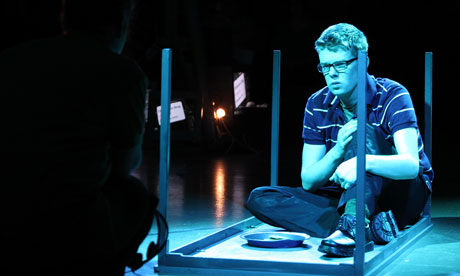
Brace yourselves. Things are about to take a turn for the meta. Theatre bloggers have been discussing theatre as it exists on the internet. So that's an online writer writing about online writing about online theatre. Got that? Good.
Broadly speaking, theatre exists in two forms online. There's theatre as digital content – live broadcasts, online video and so on – and there's digital content related to theatre, like marketing or education tools.
The first, as regular readers will know by now, is all about liveness. At Whatsonstage.com, Honour Bayes reckons there's still a division over this. "Non-believers feel the very nature of what they love is being eroded," she writes, "whilst believers think this is an exciting way to find new converts to the cause." Strangely, the way she puts it reduces such content to marketing – in this formulation live broadcasts merely function as gateways, attempts to seduce new audiences into theatres, rather than things that have intrinsic artistic merit.
But isn't this just a desirable side-effect? After all, an MP3s still serve a valuable purpose if listeners never go to gigs; arguably more so. Recordings and broadcasts reach audiences of their own. At Forest Fringe at the Gate, Postcards from the Gods' Andrew Haydon watched theatremaker Chris Thorpe perform a piece that also exists as a YouTube video. "What's odd here," he reflects, "is that I know a particular performance of the piece … Seeing it live is like seeing a band play a song you know well slightly differently."
Daniel B Yates does the same with a live transmission. Breaking with critical tradition, he reviews National Theatre Wales's new production The Radicalisation of Bradley Manning – a piece about the soldier who leaked to Wikileaks – without actually going to it. NTW are broadcasting every performance over the internet and Yates focuses on that online experience. There "is a definite form of liveness," he says. While watching, viewers can communicate with each other via a textbox onscreen and the design is neatly self-aware, "surrounded by CCTV graphics which frame your viewing, quite literally, as one of voyeurism."
Yates also points out that there have been public screenings followed by post-show discussions. "To demand that theatre back out of all this in the name of being present, to protect some notion of pure experience, is by now nothing more than ruritanian perversity." So there.
As for digital content about theatre, there's loads around at the moment. At A Younger Theatre, Jake Orr offers a neat round-up of some major new examples, including the RSC's myShakespeare site and Rupert Goold's film for his company Headlong. What's interesting is that neither organiation has, as Orr says, "just produced a piece of marketing material, [but] a piece of art in itself" or a useful resource. (In fact, social media blogger Chris Unitt has explained why it's not even very good as a marketing tool.) Personally, I've really enjoyed the Royal Court's recent Young Writers' Toolkit, including this video on plays you should read, and the Donmar Warehouse's fascinating interviews about Robert Holman.
In the past, theatres have been criticised for getting social media wrong, but there's definitely movement in the right direction. They're starting to think of us as audiences online as well as offline. Maybe it's not that hard after all. Sometimes making it work is as simple as saying: "Thanks for coming."

